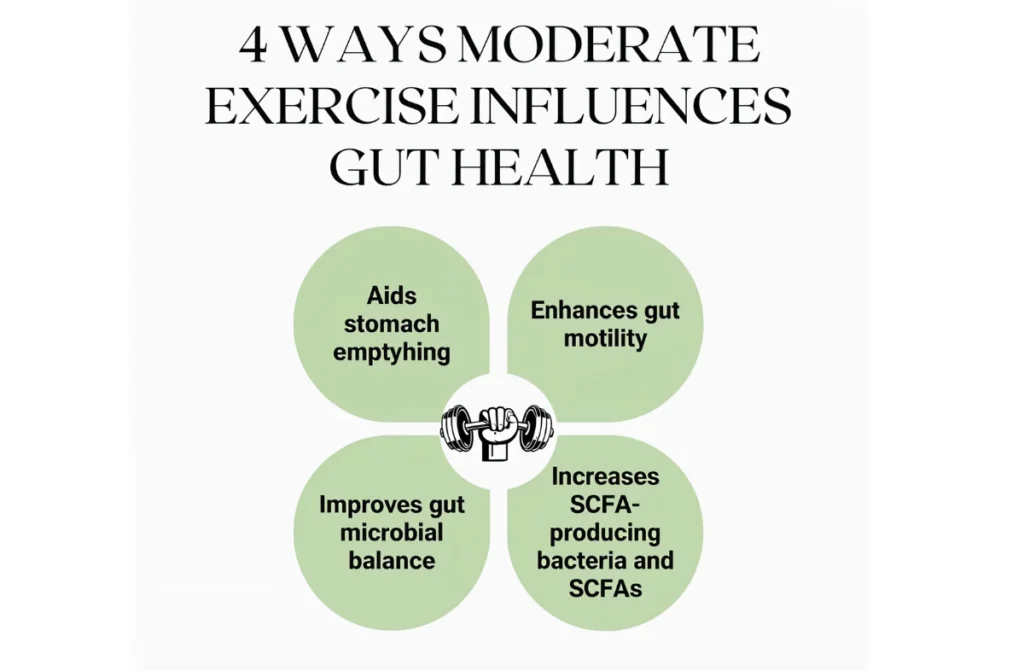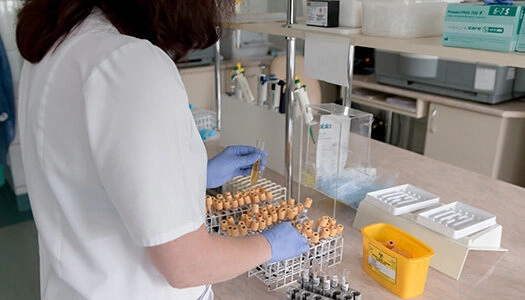At Arc Gut Clinic, we emphasize the importance of understanding the connection between exercising and gut health. Exercise plays a pivotal role in maintaining a healthy digestive system, and it has a profound effect on the gut microbiome. Regular physical activity can enhance digestion, improve gut motility, and even help balance the gut bacteria. Many studies have shown that exercise and gut health are closely linked, highlighting how movement can contribute to a healthier digestive system, reduce bloating, and optimize nutrient absorption. So, if you’re wondering, does exercise help with gut health? Absolutely! Regular physical activity can be an important part of your gut health routine.
Does Exercise Affect the Gut?
Yes, exercise and gut health are directly connected. Research has shown that regular physical activity can promote better digestion, improve nutrient absorption, and reduce inflammation within the gut. Exercise and gut microbiome are interrelated because physical activity has a positive effect on the diversity of the gut microbiota. The healthier the gut microbiome, the better your digestion.
Exercise stimulates the gut’s motility (movement), which speeds up the digestion process and helps food move through the intestines more efficiently. This improves digestion, reduces bloating, and prevents constipation. Additionally, physical activity helps maintain the integrity of the gut lining, supporting overall digestive function and reducing the risk of inflammation or leaky gut.
By promoting the growth of beneficial bacteria and reducing harmful bacteria, exercise creates a more balanced gut microbiome. The result is better overall digestive function. Plus, it’s not just about improving gut motility – does exercise help with gut health? Yes, exercise also improves blood circulation, which supports the delivery of nutrients to your digestive organs and tissues, contributing to a healthier gut.

Can Gut Health Affect How You Exercise?
Gut health can indeed influence your ability to exercise. When your gut isn’t functioning optimally, it can cause discomfort like bloating, indigestion, and gas, which may make exercising less enjoyable or even difficult. A sluggish gut may leave you feeling fatigued or low on energy, which can negatively impact your workout performance. On the other hand, a healthy gut improves your energy levels, supports efficient digestion, and helps regulate your appetite, all of which contribute to a better exercise and gut health experience.
Moreover, improving your gut health through exercise can also help balance your hormones, which play a critical role in how your body responds to physical activity. For instance, a balanced gut microbiome reduces cortisol levels (the stress hormone), which can have a calming effect on your body and help you push through challenging workouts.
How Exercise Helps Gut Health
Regular exercise offers multiple benefits for exercise and gut health Here’s a breakdown of how physical activity improves your gut function: Does exercise help with gut health? Yes, it promotes a healthy gut microbiome, enhances digestion, and boosts circulation, which are all key factors in maintaining optimal digestive health.
- Improves Gut Motility (Movement): Exercise boosts the movement of food through the digestive tract, which helps prevent constipation and bloating. A quicker transit time reduces the risk of digestive discomfort and promotes regular bowel movements.
- Boosts Circulation: Physical activity increases blood flow throughout the body, including the digestive organs. This enhanced circulation helps maintain healthy gut function and promotes better nutrient absorption.
- Tones Your Digestive Muscles: Exercise helps strengthen your abdominal muscles, which support the movement of food and waste through the intestines. This results in improved digestion and more effective elimination.
- Keeps Your Metabolism Healthy: Exercise promotes the production of beneficial hormones that regulate metabolism, which in turn can help maintain a balanced gut microbiome and promote better digestion. A healthier metabolism supports nutrient breakdown and absorption, which are essential for maintaining digestive health and overall wellness.
- Sets You Up for Sleep: Regular physical activity helps improve sleep quality, which is essential for gut health. Poor sleep can negatively affect the balance of your gut microbiome, leading to inflammation and digestive issues. Better sleep helps maintain gut health by promoting the production of healthy gut bacteria and reducing stress.
The Positive Impact of Exercise on Gut Health
Regular physical activity plays a crucial role in maintaining a healthy digestive system. Exercise and gut health are closely linked, as movement helps regulate digestion, reduce inflammation, and support beneficial gut bacteria. Studies show that individuals who engage in consistent exercise have a more diverse gut microbiome, which is essential for overall well-being.
Benefits of Exercise on Gut Health:
- Enhances gut motility, preventing constipation and bloating.
- Reduces inflammation, lowering the risk of digestive disorders.
- Supports exercise and gut microbiome diversity, promoting better digestion.
- Supports the production of essential compounds important for blood clotting and bone health.
- Strengthens the gut barrier, reducing the risk of leaky gut syndrome.
- Balances gut bacteria, improving immunity and mental health.
- Aids in the breakdown of nutrients and absorption efficiency.
How to Exercise for a Healthier Gut
Various exercises can improve exercise and gut health A balanced workout routine is key to boosting circulation, stimulating gut motility, and supporting a healthy gut microbiome, all of which contribute to better digestion
- Workouts That Work for Your Gut: Walking, yoga, and moderate-intensity aerobic exercises like cycling or swimming are excellent choices for improving exercise and gut health. These activities are gentle on the body while still enhancing digestion and promoting gut motility.
- How Often to Exercise: Aim for at least 150 minutes of moderate-intensity exercise per week. This can be broken up into 30-minute sessions, five days a week. Consistency is crucial for seeing long-term benefits. The regularity of exercise is one of the key factors that improves the gut microbiome and supports overall digestive health.
- Start Slowly: If you’re new to exercise, begin with low-impact activities like walking or stretching and gradually increase the intensity as your body adapts. This will allow your digestive system to adjust without causing unnecessary strain. Over time, your gut will thank you for building a strong foundation.
- Use Care with Cardiac Conditions: If you have any pre-existing heart conditions or other health concerns, it’s important to consult with a healthcare professional before starting an exercise routine. It’s important to choose exercises that are safe for your heart while still benefiting your gut health. Your doctor can help tailor a fitness program that works best for your body.
How Much Should I Exercise?
The right amount of physical activity varies for individuals, but experts recommend at least 150 minutes of moderate-intensity exercise or 75 minutes of vigorous activity per week. To maximize exercise and gut health, focus on a mix of cardio, strength training, and flexibility exercises.
Best Exercises for Gut Health:
- Aerobic exercises (e.g., walking, running, cycling) boost gut microbiota diversity.
- Strength training enhances digestion and metabolic function.
- Yoga and stretching reduce stress and improve gut-brain communication.
- High-Intensity Interval Training (HIIT) promotes gut-friendly bacterial growth.
Regular physical activity positively affects the exercise and gut microbiome, encouraging a balance of good bacteria that helps digestion and prevents gut-related issues.
Exercise and the Gut Microbiome
Research has shown that exercise and gut microbiome are intrinsically linked. Regular physical activity has a positive impact on gut bacteria diversity, which is crucial for maintaining a healthy digestive system. Exercise promotes the growth of beneficial bacteria and suppresses the growth of harmful microbes.
Not only does exercise encourage the growth of beneficial bacteria, but it also reduces gut inflammation. Chronic inflammation is a common cause of digestive issues, and exercise helps reduce this by regulating inflammatory markers in the body. Exercise and gut health go hand in hand because when your gut is healthy, your body can absorb nutrients better, improve immunity, and have more energy for exercise.
Gut Bacteria and Vitamin K
An essential relationship exists between gut bacteria and vitamin K. Healthy gut bacteria play a critical role in the production of vitamin K, a fat-soluble vitamin that is important for bone health, blood clotting, and gut health. Exercise has been shown to positively influence gut bacteria, promoting the production of vitamin K and improving its absorption by the body.
Vitamin K is crucial for calcium absorption, which is essential for maintaining a healthy gut lining and supporting digestion. A healthy gut microbiome, supported by exercise, helps regulate gut bacteria and vitamin K production and absorption, thereby supporting a strong and balanced gut. Consistent physical activity can optimize the gut’s ability to produce and absorb gut bacteria, thereby benefiting overall gut function.
How Do Gut Bacteria Affect Your Health?
Your gut is home to trillions of bacteria, both beneficial and harmful. These microbes influence digestion, immune function, mental health, and even metabolism. A well-balanced gut microbiome can:
- Improve digestion and nutrient absorption
- Reduce inflammation and boost immunity
- Support mental health by producing serotonin and other neurotransmitters
- Help regulate weight and prevent metabolic disorders
However, an imbalance in gut bacteria can lead to issues like bloating, constipation, irritable bowel syndrome (IBS), and chronic inflammation.
How Can You Support Your Gut Microbiota?
The gut microbiota consists of trillions of microorganisms that play a crucial role in digestion, nutrient absorption, immunity, and overall health. Supporting this ecosystem is essential for maintaining balance within the body. Lifestyle factors, particularly those related to diet and physical activity, significantly influence microbial diversity and stability.
To encourage a thriving gut environment:
- Consume a fiber-rich diet with fruits, vegetables, legumes, and whole grains.
- Include fermented foods like yogurt, kefir, and kimchi, which introduce beneficial bacteria.
- Limit processed foods and sugars, which may disrupt microbial balance.
- Stay hydrated, as fluids help digestion and maintain mucosal lining in the intestines.
- Manage stress levels, as chronic stress alters microbial composition and impairs gut function.
Maintaining these habits consistently creates favorable conditions for beneficial microbes to flourish, supporting both digestive health and immune function.
Why Exercise Is a Necessity for Digestive Health
Physical activity isn’t just for cardiovascular strength or weight management—it directly influences how the digestive system functions. Regular movement enhances intestinal motility, preventing issues like constipation and bloating. It also supports hormonal regulation and reduces systemic inflammation, both of which are closely tied to digestive well-being.
The physiological impact of staying active includes:
- Improved circulation, which supports nutrient transport and organ function.
- Enhanced metabolism, aiding in more efficient nutrient breakdown and absorption.
- Reduced inflammation, lowering the risk of conditions like IBS or colitis.
- Balanced nervous system, which helps regulate the gut-brain axis, key in managing digestive disorders.
Even moderate activity levels can make a significant difference in how the digestive system performs day to day.
5 Best Exercises for Digestive Health
Not all physical activities affect digestion equally. Some forms of movement are particularly beneficial because they gently stimulate the abdominal area, improve circulation, and help regulate bowel habits without straining the body.
Here are five exercises that support digestive function effectively:
- Walking: A 20–30 minute daily walk helps stimulate intestinal contractions, promoting regular bowel movements.
- Yoga: Poses like Child’s Pose, Seated Twist, and Bridge Pose massage abdominal organs and ease bloating.
- Cycling: Low-impact cycling enhances blood flow and core strength, supporting digestion.
- Swimming: The rhythmic movement of swimming relaxes muscles and supports healthy digestion without causing stress to joints.
- Tai Chi: This gentle martial art reduces stress while improving circulation and internal energy flow, positively influencing digestive comfort.
Incorporating these movements into a weekly routine helps create an environment where digestion is smooth, efficient, and less prone to discomfort.
Conclusion
As we’ve seen, exercise and gut health are deeply interconnected. Regular physical activity not only improves gut motility but also enhances the diversity of gut bacteria, promotes the production of beneficial nutrients like vitamin K, and reduces gut inflammation. Whether it’s improving digestion, boosting circulation, or setting you up for better sleep, exercise plays an essential role in maintaining a healthy digestive system.
At Arc Gut Clinic, we believe in a holistic approach to gut health. Exercise, along with proper nutrition, hydration, and stress management, can help cultivate a thriving gut microbiome. Regular exercise will benefit your gut health in the long term and lead to better digestion, reduced bloating, and improved overall wellness.
Read also All Disease Begins in the Gut.









